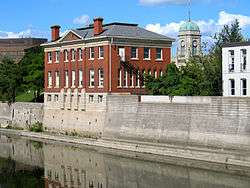Tri-Cities (Ontario)
| Tri-Cities Kitchener–Cambridge–Waterloo CMA | |
|---|---|
| Metropolitan area | |
|
Downtown Kitchener skyline | |
 Old Galt Public Library in Cambridge | |
|
Uptown Waterloo at King Street | |
| Country |
|
| Province |
|
| Government | |
| • Regional Chair | Ken Seiling |
| • Governing Body | Waterloo Regional Council |
| • MPs |
List of MPs
|
| • MPPs |
List of MPPs
|
| Area (2011)[1] | |
| • Total | 827.43 km2 (319.47 sq mi) |
| Population (2011)[1] | |
| • CMA | 523,894 |
| • CMA density | 576.7/km2 (1,494/sq mi) |
| Time zone | UTC-5 (EST) |
| • Summer (DST) | UTC-4 (EDT) |
| Area code(s) | (519) and (226) |
The Tri-Cities, also known as Kitchener–Cambridge–Waterloo, is a metropolitan area located in Southern Ontario, Canada. It is centred on the cities of Kitchener, Cambridge, and Waterloo. These cities, as well as surrounding rural municipalities, collectively make up the Regional Municipality of Waterloo. The census metropolitan area (CMA) had a population of 523,894 in 2016, making it the fourth largest metropolitan area in Ontario, after Toronto, Ottawa and Hamilton, and the tenth largest metropolitan area in the country. The tri-cities area is known for its high concentration of information technology companies – including Google, BlackBerry Limited, OpenText, Kik Interactive, and Maplesoft – leading it to be frequently characterized as "Canada's Silicon Valley,"[2][3] or "Canada's Technology Triangle." The Tri-Cities are also university towns with a large student population from the University of Waterloo, Wilfrid Laurier University, and Conestoga College.
The area is also known for its high concentration of Mennonites. There are many Mennonite churches in the area, serving the New Mennonites, Conservative Mennonites, Old Order Mennonite and the Mennonite Brethren.
Government
The region's governing body is the 16 member Waterloo Regional Council. The Council consists of the Regional Chair, the Mayors of the seven cities and townships, and eight additional Councilors: four from Kitchener and two each from Cambridge and Waterloo.
Prior to 1997, the Regional Chair was appointed by the Councilors, who were elected by the citizens of Waterloo Region. Beginning in the 1997 election, the citizens of Waterloo Region have directly elected the Chair. Of the nine regional municipalities in Ontario, Waterloo Region and the Regional Municipality of Halton are the only ones that allow for direct election of the Chair.
Ken Seiling has held the position of Regional Chair since 1985. The current membership of the Council is as follows:
| Regional Chair | Ken Seiling |
|---|---|
| City of Cambridge | Doug Craig (Mayor) Karl Kiefer Helen Jowett |
| City of Kitchener | Berry Vrbanovic (Mayor) Karen Redman Tom Galloway Geoff Lorentz Elizabeth Clarke |
| City of Waterloo | Dave Jaworsky (Mayor) Jane Mitchell Sean Strickland |
| Township of Woolwich | Sandy Shantz (Mayor) |
| Township of Wellesley | Joe Nowak (Mayor) |
| Township of Wilmot | Les Armstrong (Mayor) |
| Township of North Dumfries | Sue Foxton (Mayor) |
Communities by population
| Census Subdivision | Population[4] | ||
|---|---|---|---|
| 2016 | 2011 | 2006 | |
| City of Kitchener | 233,222 | 219,153 | 204,668 |
| City of Cambridge | 129,920 | 126,748 | 120,371 |
| City of Waterloo | 104,986 | 98,780 | 97,475 |
| Township of Woolwich | 25,006 | 23,145 | 19,658 |
| Township of Wilmot | 20,565 | 19,223 | 17,097 |
| Township of Wellesley | 11,260 | 10,713 | 9,789 |
| Township of North Dumfries | 10,215 | 9,334 | 9,063 |
| Total | 535,174 | 507,096 | 478,121 |
Notable residents
- Kitchener is the birthplace of William Lyon Mackenzie King, Canada's longest serving Prime Minister. His boyhood home is now Woodside National Historic Site.
- David Johnston, former Governor General of Canada and former President of the University of Waterloo, lives in Wellesley Township.
- Author David Chilton, who wrote the best-selling Canadian book to date, the financial planning guide The Wealthy Barber, was born in Kitchener and lives in the region.
- Dave Sim, creator of the comic book Cerebus the Aardvark, has lived in Kitchener since he was two years old.
- Author and journalist Malcolm Gladwell grew up in Elmira, Ontario.
- Homer Watson, internationally renowned landscape artist, was from Kitchener.
- Rich Beddoe is the current drummer for the Canadian rock band Finger Eleven. He is from Cambridge.
- Lois Maxwell, Golden Globe winning actress and the original Miss Moneypenny in the James Bond movies, was born in Kitchener.
- Actor David Orth, formerly of Sir Arthur Conan Doyle's The Lost World, grew up in Kitchener.
- Actor Jeremy Ratchford from Cold Case grew up in Kitchener.
- Mike Lazaridis, founder of Research In Motion, came as a student to attend the University of Waterloo.
- Joseph E. Seagram was a partner in 1869, and sole owner in 1883, of the company later known as Seagram.
- Donald Shaver created a world leading poultry breeding business.
- Boxer Lennox Lewis lived in Kitchener from the age of 12 and began his boxing career there. He maintains a home in Kitchener.
- Former hockey all-star Scott Stevens of the New Jersey Devils was born in Kitchener and played for the Kitchener Rangers. He also maintains a home there.
- Hockey player Todd Bertuzzi of the Detroit Red Wings makes his off-season home in Kitchener.
- Tim Brent is a hockey player from Cambridge.
References
- 1 2 "Population and dwelling counts, for census metropolitan areas, 2011 and 2006 censuses". Statistics Canada. 2012-02-08. Retrieved 2016-12-15.
- ↑ "Archived copy". Archived from the original on 2015-12-08. Retrieved 2015-11-30.
- ↑ http://www.inc.com/zoe-henry/waterloo-startup-hot-spot.html
- ↑ "Population and Dwelling Count Highlight Tables, 2016 Census". Retrieved 2017-02-11.